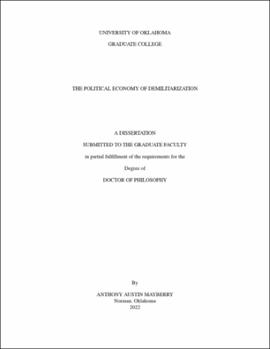| dc.contributor.advisor | Rogers, Cynthia | |
| dc.contributor.author | Mayberry, Anthony | |
| dc.date.accessioned | 2022-05-04T19:35:20Z | |
| dc.date.available | 2022-05-04T19:35:20Z | |
| dc.date.issued | 2022-05-13 | |
| dc.identifier.uri | https://hdl.handle.net/11244/335506 | |
| dc.description.abstract | This dissertation studies the economic implications of demilitarization. My primary contributions include: (1) defining demilitarization statistically and creating a novel dataset of military transitions, (2) empirically testing the impact of demilitarization on economic growth, (3) identifying a relationship between demilitarization and international trade, and (4) providing a case study on the economic impact of militarization in contrast with my findings on demilitarization.
In chapter one, I create the novel dataset of military transitions since 1960 and measure the economic growth effect of demilitarization in countries that reduced their military capabilities and subsided aggressive or violent behavior. I estimate that on average, demilitarization is associated with a 1% higher annual GDP per capita than if the country had remained militarized. Dynamic analysis shows that on average, GDP per capita is 15-20% higher 20 years after transition.
In chapter two, I assemble a panel dataset from the last 140 years of bilateral international trade flows, formal military alliances, and military capacity, in order to study the relationship between trade and demilitarization. I uncover three stylized facts: (1) entry into formal defense agreements corresponds with reduced military capacity, (2) dyadic country pairs trade more when they are engaged in a formal military alliance, and (3) gains in trade from formal alliances are larger when country pairs reduce military capacity.
Finally, in chapter three, I estimate the economic effect of militarization. Using Pakistan's nuclear proliferation efforts beginning in 1972 as a case study, I perform a synthetic control analysis and find that Pakistan’s economy was 27.8 percent smaller than expected, 25-years after the start of the nuclear program. | en_US |
| dc.language | en_US | en_US |
| dc.rights | Attribution-NonCommercial-NoDerivatives 4.0 International | * |
| dc.rights.uri | https://creativecommons.org/licenses/by-nc-nd/4.0/ | * |
| dc.subject | Economics, General. | en_US |
| dc.subject | Economics, History. | en_US |
| dc.subject | Political Science, International Law and Relations. | en_US |
| dc.title | The Political Economy of Demilitarization | en_US |
| dc.contributor.committeeMember | Hamory, Joan | |
| dc.contributor.committeeMember | Kuruc, Kevin | |
| dc.contributor.committeeMember | Raymond, Mark | |
| dc.date.manuscript | 2022-04-28 | |
| dc.thesis.degree | Ph.D. | en_US |
| ou.group | Dodge Family College of Arts and Sciences::Department of Economics | en_US |
| shareok.orcid | 0000-0001-9039-3888 | en_US |

